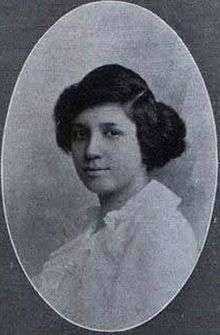Euphemia Haynes
Martha Euphemia Lofton Haynes (September 11, 1890 in Washington, D.C. – July 25, 1980 in Washington, D.C.) was an American mathematician and educator. She was the first African-American woman to gain a PhD in mathematics, from the Catholic University of America in 1943.[1]
Euphemia Lofton Haynes | |
|---|---|
 | |
| Born | 11 September 1890 |
| Died | 25 July 1980 (aged 89) Washington, D.C., United States |
| Nationality | American |
| Alma mater | The Catholic University of America |
| Scientific career | |
| Fields | Mathematics |
| Thesis | Determination of Sets of Independent Conditions Characterizing Certain Special Cases of Symmetric Correspondences (1943) |
| Doctoral advisor | Aubrey Edward Landry |
Life
Euphemia Lofton was the first child and only daughter of William S. Lofton, a dentist and financier, and Lavinia Day Lofton, a kindergarten teacher. She was the valedictorian of M Street High School in 1907 and then graduated from University of the District of Columbia with distinction and a degree in education in 1909.[2] She went on to earn an undergraduate mathematics major (and psychology minor) from Smith College in 1914.[2] In 1917 she married Harold Appo Haynes, a teacher. She gained a master's degree in education from the University of Chicago in 1930. In 1943 gained her PhD from The Catholic University of America with a dissertation, supervised by Aubrey Landrey, entitled The Determination of Sets of Independent Conditions Characterizing Certain Special Cases of Symmetric Correspondences.[1][2]
Haynes "contributed quite grandly to the educational system of the District of Columbia."[2] She taught in the public schools of Washington, D.C., for 47 years and in 1966 became the first woman to chair the DC Board of Education, on which she served through 1967[3]. While on the DC Board of Education, she was an outspoken critic of the "track system", which she argued discriminated against African American Students by assigning them to tracks that left them unprepared for college[3]. This work contributed towards the filing of Hobson v. Hansen (1967) which led to the end of the track system in DC[3]. She taught first grade at Garrison and Garfield Schools, and mathematics at Armstrong High School. She taught mathematics and served as chair of the Math Department at Dunbar High School. Haynes was a professor of mathematics at University of the District of Columbia where she was chair of the Division of Mathematics and Business Education, a department she created dedicated to training African American teachers.[2]
She retired in 1959 from the public school system, but went on to establish the mathematics department at University of the District of Columbia. She also occasionally taught part-time at Howard University. Haynes was involved in many community activities. She served as first vice president of the Archdiocesan Council of Catholic Women, chair of the Advisory Board of Fides Neighborhood House, on the Committee of International Social Welfare, on the Executive Committee of the National Social Welfare Assembly, secretary and member of the Executive Committee of the DC Health and Welfare Council, on the local and national committees of the United Service Organization, a member of the National Conference of Christians and Jews, Catholic Interracial Council of Washington, the Urban League, NAACP, League of Women Voters, and the American Association of University Women. In addition, Pope John XXIII awarded her the Papal decoration of honor, Pro Ecclesia et Pontifice, in 1959.
Legacy
Haynes died of a heart attack on July 25, 1980 in her hometown, Washington, D.C. She had set up a trust fund to support a professorial chair and student loan fund in the School of Education, giving $700,000 to Catholic University. Her family papers are housed in the Catholic University archives.[2]
In 2004, the E.L. Haynes Public Charter School in Washington, DC was named in her honor. The Catholic University of America established the Euphemia Lofton Haynes Award to recognize outstanding junior mathematics majors who have demonstrated excellence and promise in their study of mathematics.[4]
Published Works
Euphemia Lofton Haynes. The Historical Development of Tests in Elementary and Secondary Mathematics. University of Chicago, Department of Education (1930). [5]
Euphemia Lofton Haynes. Determination of Sets of Independent Conditions Characterizing Certain Special Cases of Symmetric Correspondences. Catholic University of America Press (1943). [6]
References
- Larry Riddle, Euphemia Lofton Haynes, Biographies of Women Mathematicians at Agnes Scott College
- Mazzenga, Maria (February 4, 2016). "The Archivist's Nook: African American History? You're Standing On It". The Catholic University of America. Retrieved February 8, 2016.
- "Euphemia Lofton Haynes, first african american woman mathematican". www.math.buffalo.edu. Retrieved 2020-06-10.
- "Euphemia Lofton Haynes Award". The Catholic University of America. November 26, 2018. Retrieved December 20, 2018.
- Haynes, Euphemia Lofton (1930). The Historical Development of Tests in Elementary and Secondary Mathematics. University of Chicago, Department of Education, August.
- Haynes, Euphemia Lofton (1943). Determination of Sets of Independent Conditions Characterizing Certain Special Cases of Symmetric Correspondences. Catholic University of America Press.
External links
- Family papers held at the Catholic University of America
- Biography (with multiple photos) by Susan Kelly, Carly Sinners, Katherine Zoroufy: Euphemia Lofton Haynes: Bringing Education Closer to the "Goal of Perfection"
- Euphemia Haynes at the Mathematics Genealogy Project
- Williams, Scott W. (1 July 2001). "Martha Euphemia Lofton Haynes, first African American woman mathematician". Mathematicians of the African diaspora. Retrieved 21 May 2014.
- Martha Euphemia Lofton-Haynes: Mathematician, Educator, and Mentor
- Robin Weatherl, Euphemia L. Haynes, Leading the Way for Women in Mathematics, The Young Women's Online Journal of Teaching and Learning Mathematics